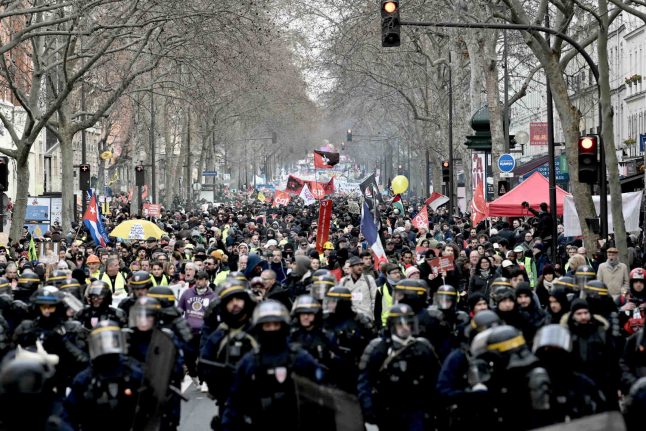The overture from Prime Minister Edouard Philippe came as protesters smashed storefronts in clashes with police in Paris, with the transport shutdown against the pension overhaul dragging into its sixth week.
“I am willing to withdraw from the bill the short-term measure I had proposed,” said Philippe, offering to scrap the most contested initiative that would in effect have raised the retirement age by two years to 64.
French President Emmanuel Macron hailed the plan as “a constructive and responsible compromise.”
READ: French police face probe after video emerges of Paris protest clashes
The hardline CGT union, which has taken a leading role in the strike action, swiftly poured cold water on the government's offer, calling the compromise proposal “a smokescreen to get some unions to sign on” to the overall reform.
The more moderate CFDT and UNSA unions welcomed Philippe's offer, meaning the government may succeed in splitting the unions on the reforms.
An inter-union body which includes the CGT and fellow hardline union the FO among others called for a new days of protests next week.
'We are still here!'
The government's move came a day after they met with unions in a bid to end the labour action that has frustrated Paris commuters, ruined December holiday travel plans, and carved away at business bottom lines.
Demonstrators in the capital, some masked and hooded, broke shop windows along their protest route Saturday, set fires and threw projectiles at police in riot gear, who responded with tear gas.
Several stores were ransacked as marchers brandished union flags and chanted defiantly: “We are still here!” and “Macron resign”.
Protests were also held in Marseille, Toulouse, Lyon, Nantes and elsewhere. The interior ministry said 149,000 people had turned out throughout France.
The CGT put the overall figure at half a million, saying the 150,000 marched in Paris alone.
In one of Macron's signature reforms, the government seeks to fuse 42 existing pension schemes into a single, points-based system it says will be fairer and more transparent but which unions fear will see millions work longer for a smaller retirement payout.
Particularly vexing was the proposal to impose the 64 “pivot age” that people would have to work until to qualify for a full pension — two years beyond the official retirement age.
Contribute more, or work longer
On Friday, Macron said that for the pension system to remain viable as a growing number of retirees live ever longer, “either one has to contribute more, or one has to agree to work a little longer”, while insisting he does not want to see pensions lowered.
The government says the “pivot age” would save five billion euros ($5.6 billion) by 2023 and some 11 billion euros by 2026.
Philippe said the concept of an “age of equilibrium” would remain part of the reform, though he did not spell out what this means.
The premier also announced there would be a conference, as demanded by union leaders, to study ways of financing the pension system, which must come up with proposals by the end of April.
If it succeeds, MPs will be able to work the resulting proposals into the draft pension reform bill the government hopes to introduce to parliament by February 17.
If it fails, the government will take the “measures necessary to achieve equilibrium” in the system by 2027, the prime minister warned. On Day 38 of the strike, some were fed up.
“We have had enough,” estate agent Christophe Delvallee, 65, told AFP at the Aulnay-sous-Bois train station outside Paris.
“It has been a month and a half. These are people with many advantages and employment guaranteed for life, and who are making life difficult for the rest of us.”
His daily 75-minute commute to work now takes up to 2.5 hours.
Opera closed
Commuting has become a daily headache for many, with train services and Paris metro lines again curtailed Saturday, and regional and inter-city train numbers slashed.
The Paris rail operator RATP said after Philippe's announcement Saturday that all metro and suburban trains will run on Sunday, though still offering only partial service.
Most rail workers are aligned to the CGT. The Paris Opera, which was to launch its official new season on Saturday, cancelled its performance of The Barber of Seville due to opera workers' continuing participation in the strike.
Like railway workers at the forefront of the strike action, opera staff enjoy early retirement benefits under their sectoral pension scheme, and are reluctant to give these up.
The Paris Opera says it has lost 12.3 million euros ($13.7 million).



 Please whitelist us to continue reading.
Please whitelist us to continue reading.
Member comments